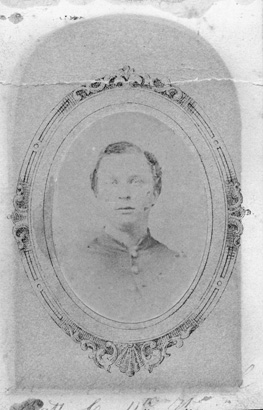George Oscar French Letters
George Oscar French, called Oscar, was the second of six children born to Ezra Warner French and Amanda Roberts French of Castleton, Vermont. Ezra was a farmer and worked in the slate trade, doing roofing, among other things. Oscar was born April 25, 1844, and killed on April 2, 1865, just before the Battle of Richmond.
Oscar French enlisted in Company C, 11th Vermont Volunteers, and trained at Brattleboro into early September, ending up as a sergeant. He next moved to the defenses of Washington, serving mostly in a heavy artillery unit, and remained there until May 13, 1864. After that he saw a great deal of heavy action, often as an infantryman including at Cold Harbor, the Shenandoah Valley (he received a wound at Cedar Creek), and Petersburgh. He was commissioned 2nd Lieutenant June 28, 1864. He was killed on April 2, 1865, during the last week of the war.
 French's letters are extensive, covering the period from August 6, 1862, the day on which he enlisted, until April 1, 1865, the day before he was killed. Most are written to his parents in Castleton, Vermont. Among other topics, the letters contain a debate between father and son about the ongoing merits of the war, Oscar's criticism of his father's pro-McClellan stance, the soldier's view of the Abolitionists (against them), his impressions of the plights of the slaves (sympathetic), and his unfettered views of the harshness of military life.
French's letters are extensive, covering the period from August 6, 1862, the day on which he enlisted, until April 1, 1865, the day before he was killed. Most are written to his parents in Castleton, Vermont. Among other topics, the letters contain a debate between father and son about the ongoing merits of the war, Oscar's criticism of his father's pro-McClellan stance, the soldier's view of the Abolitionists (against them), his impressions of the plights of the slaves (sympathetic), and his unfettered views of the harshness of military life.
Most of Oscar’s letters refer to action on his immediate front, not how the war is going in general, though in March of 1864 he writes, “as old U. S. G. is in command, that he will rush things in every direction.” During a heavy bombardment he writes, “The most fault I find is the unpleasant sound of various dense bodies moving through the air with great velocity. A minie ball cut my hair just above my right ear, did not hurt.”
The collection includes Oscar’s last letter, written the day before he was killed. This letter must have arrived home at the same time the letter from the U. S Treasury requesting that he return the $250 bonus he had received on his enlistment because he was no longer entitled to it due to his receiving a commission. French’s body was temporarily lost at City Point, Virginia, and could not be returned home at once due to the nature of his wound and the inability to properly embalm him. There is a letter itemizing the costs of having the body sent home, though an earlier letter mentions of a collection taken up by the men to have the body shipped home.
The collection includes pages from a diary Oscar kept in September and October 1864 when he was campaigning in the Shenandoah Valley and saw heavy action. It also includes an 1863 letter from Samuel Dowling to Oscar's father and an 1865 letter to Oscar from John G. Farwell.
These transcriptions were made by Dawn Hance, typed by Joann Nichols, and edited by Paul Zeller.
- Full finding aid for collection (PDF)
- Transcriptions of letters, 1862 (PDF)
- Transcriptions of letters, 1863 part 1 (PDF)
- Transcriptions of letters, 1863 part 2 (PDF)
- Transcriptions of letters, 1864 part 1 (PDF)
- Transcriptions of letters, 1864 part 2 (PDF)
- Transcriptions of letters, 1865 (PDF)
- Diary, 1864 (PDF)
- Letter, Samuel Dowling to E. W. French, 1863 (PDF)
- Letter, John G. Farwell to G. O. French, 1865 (PDF)
- Letters to family after his death (PDF)